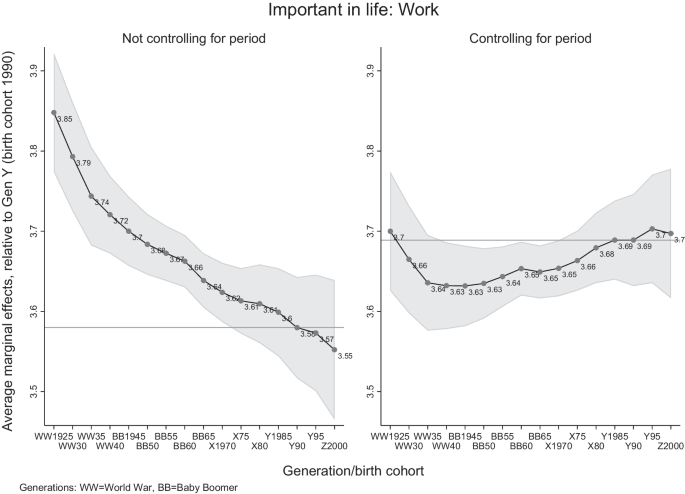Work Motivation Is Not Generational but Depends on Age and Period
IF 4.9
2区 心理学
Q2 BUSINESS
引用次数: 0
Abstract
Abstract Many argue that work motivation varies with year of birth, suggesting the utility of generational labels such as Z, Y, X, or Baby Boomer. This article tests this generational hypothesis by using multilevel regressions with data from 584,217 individuals sampled by the Integrated Values Survey in 113 countries over more than 30 years. The results show that the importance of work first increases and then decreases with an individual’s age and that the importance of work tends to decrease for everyone with the passing of historical time. These age and period effects make later-born generations seem work averse, while birth year and thus generational membership hardly explain work motivation after accounting for age and period effects. The article also tests whether ten other work-related attitudes can be explained through generational membership. The results suggest that the historical time period and an individual’s life course explain work motivation and work attitudes better than generational membership. This life course and historical explanation is suggested as an alternative to the generational hypothesis of work motivation and attitudes that prevails in much of the literature.

工作动机不是世代相传的,而是取决于年龄和时期
许多人认为,工作动机随出生年份的不同而不同,这暗示了世代标签的效用,如Z、Y、X或婴儿潮一代。本文通过对113个国家30多年来的综合价值观调查中584,217个人的数据进行多层次回归,检验了这一代际假设。结果表明,随着年龄的增长,工作的重要性先增加后降低,随着历史时间的推移,工作的重要性对每个人来说都有降低的趋势。这些年龄和时期的影响使得后辈似乎厌恶工作,而在考虑了年龄和时期的影响后,出生年份和代际关系几乎无法解释工作动机。文章还测试了其他十种与工作有关的态度是否可以通过代际关系来解释。结果表明,历史时期和个人的生活历程比代际关系更能解释工作动机和工作态度。这种生命历程和历史解释被认为是对工作动机和态度的代际假设的替代,这种假设在许多文献中普遍存在。
本文章由计算机程序翻译,如有差异,请以英文原文为准。
求助全文
约1分钟内获得全文
求助全文
来源期刊

Journal of Business and Psychology
Multiple-
CiteScore
8.80
自引率
4.20%
发文量
70
期刊介绍:
The Journal of Business and Psychology (JBP) is an international outlet publishing high quality research designed to advance organizational science and practice. Since its inception in 1986, the journal has published impactful scholarship in Industrial/Organizational Psychology, Organizational Behavior, Human Resources Management, Work Psychology, Occupational Psychology, and Vocational Psychology.
Typical subject matters include
Team processes and effectiveness
Customer service and satisfaction
Employee recruitment, selection, and promotion
Employee engagement and withdrawal
Organizational culture and climate
Training, development and coaching
Mentoring and socialization
Performance management, appraisal and feedback
Workplace diversity
Leadership
Workplace health, stress, and safety
Employee attitudes and satisfaction
Careers and retirement
Organizational communication
Technology and work
Employee motivation and job design
Organizational change and development
Employee citizenship and deviance
Organizational effectiveness
Work-nonwork/work-family
Rigorous quantitative, qualitative, field-based, and lab-based empirical studies are welcome. Interdisciplinary scholarship is valued and encouraged. Submitted manuscripts should be well-grounded conceptually and make meaningful contributions to scientific understandingsand/or the advancement of science-based practice.
The Journal of Business and Psychology is
- A high quality/impactful outlet for organizational science research
- A journal dedicated to bridging the science/practice divide
- A journal striving to create interdisciplinary connections
For details on submitting manuscripts, please read the author guidelines found in the far right menu.
 求助内容:
求助内容: 应助结果提醒方式:
应助结果提醒方式:


